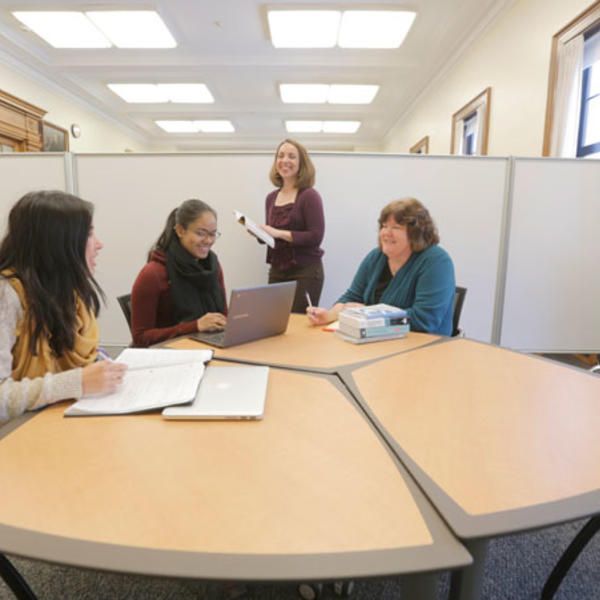There is no required Intro to Writing class at the College of the Holy Cross. No Academic Writing seminar. No How to Write the College Essay 101.
How then does Holy Cross expect to turn out good writers? As you might expect, the answer can be found in Cell Biology 266.
Associate Biology Professor Michelle Mondoux says that many professors in the sciences struggle with teaching writing. "As a group, we feel unqualified to teach writing," she says. "We feel qualified to assign writing."
But clear, effective writing is crucial in the career of a biologist. Every researcher needs to publish in journals and to apply for grants. So Mondoux carves out precious class time to work on those things.
Every semester, Mondoux’s students must write mock National Institutes of Health grant applications, then critique each others’ work and decide which of their peers’ projects they would choose to fund. It’s Mondoux’s favorite class of the semester.
How does she justify taking time away from studying the structure and function of eukaryotic cells, homeostasis, intracellular compartments and protein trafficking? And what if there’s not enough time for the cytoskeleton?
"What we spend class time on is how we communicate what’s important," says Mondoux. And at Holy Cross, writing is important.
In 2015, Holy Cross established its Center for Writing, through a generous gift from Agnes N. Williams P'83. Its mission is to instill a positive culture of writing into every academic discipline, from the physics lab to the stage in the theater department. The teaching of writing is not confined to a single first-year class, or even to classes in the humanities. Instead, it’s infused throughout the College curriculum.
"It’s everyone’s responsibility," says Laurie Ann Britt-Smith, the Center’s director. Britt-Smith keeps in her office a large poster board that says "Writing is Never ‘Just’ Writing" – a phrase, she says, that embodies the Jesuit ideal of Eloquentia Perfecta. She occasionally brings along the poster board when she gives a talk to underscore that point.
She and colleague Kristina Reardon, associate director of the Center for Writing, spend their days presenting to classes across every department. One day, they might be in a physics class talking about writing effective introductions, and the next day, a history class to discuss annotated bibliographies. They wind up spending as much time in science labs as in humanities classes.
The Writing Center offers Holy Cross faculty support in a number of ways, including one-on-one consultations about course materials and writing pedagogies, as well as in-class workshops. Plans are in motion for a faculty collaborative on writing issues. They also manage the student Writers Workshop, where Holy Cross students meet with trained, peer consultants to talk about their progress as writers and to get help at any part of the writing process.
Britt-Smith explains that by removing the onus to create good writers from a single introductory class, the College’s curriculum instead places the responsibility with everyone. And while there is no College Writing 101 required course, the positive culture of writing is instilled early on in a student’s Holy Cross experience.
It starts in Montserrat, Holy Cross’ innovative year-long program for first-year students. Montserrat courses are built on a single theme — environmental justice or Chinese culture, for example — but their underlying goal is to cultivate in students a shift in their ways of learning, one that reflects the values of a liberal arts education. That includes thoughtful, clear, reflective writing.
Indeed, eloquence is one of the core values of Holy Cross’ liberal arts curriculum. In 2012, the College’s Presidential Colloquium on Jesuit Liberal Arts issued a report that said, "Eloquence plays a crucial role in the search for liberation and truth. Critical inquiry has little impact without the ability to share, debate and reshape our ideas with others. The long tradition of Jesuit education emphasizes learning to speak persuasively, to write crisply, to argue and debate effectively, and to express oneself creatively."
Faculty members across departments are now putting their heads together to develop these ideas even further and produce College-wide writing goals through an initiative called Writing Across Curriculum. It’s an initiative that seeks to expand the first-year writing goals and to continue them across all four years of a student’s time at Holy Cross.
Britt-Smith says, "That's the big question: What is good writing? What does it mean, and how do we assess it?"
This story was originally published in the March issue of "Connections," a monthly publication of the Association of Jesuit Colleges and Universities.
Related
MLA Style Center, April 16: Adopting Writing Center Practices in Teaching



